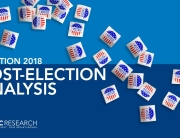Written by John Almond, Research Manager
Experimental testing is one of many tools in a market researcher’s toolkit to understand how messaging or creative executions affect real world behavior. Frequently applied to web design, A/B testing is a research method often used to test pages’ layouts, graphics and fonts in order to optimize the user experience or to discover which design elements drive the most clicks, user sign ups or purchases.
However, the approach can also be leveraged in a number of other powerful ways to hone a communications strategy, optimize messaging, and maximize the effectiveness of an organization’s social media strategy.
On one hand, technology and these experimental techniques can profoundly improve consumers’ experience—for example, providing more relevant and personalized content to users. There is a fine line however—researchers and companies need to make sure that data is collected, analyzed and used in a way that protects users’ privacy and doesn’t expose them to potential risks. Without taking ethical concerns into consideration, efforts can backfire and significantly damage a brand.
In fact, the ethical implications of online experimental testing recently came under scrutiny when Facebook published the results of a study that revealed over half a million users had their news feeds adjusted with either more positive or more negative toned posts to see if it had an effect on their moods and emotions.
“Although academic protocols generally call for getting people’s consent before psychological research is conducted on them, Facebook didn’t ask for explicit permission from those it selected for the experiment.” – The New York Times
Taking these and other ethical questions into consideration will be increasingly important as market researchers leverage social media, mobile, and other digital technologies more frequently to evaluate communications strategies. And as responsible practitioners, we owe it to our customers and our customers’ customers to start a dialog on the appropriate use of online experimental testing.









